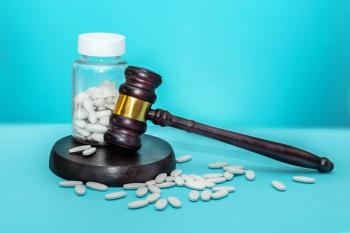
- Drug Topics December 2021
- Volume 165
- Issue 12
Cannabis Consulting: Are You Ready?
Most pharmacists are moderately to not-at-all comfortable answering patient questions about cannabis. That needs to change.
When it comes to cannabinoids, some pharmacists find themselves on shaky ground: according to Jeffrey Stewart, RPh, 78% of pharmacists are uncomfortable answering patient questions about CBD, and 76% didn’t know that CBD is just an abbreviation for cannabidiol.
Stewart—cofounder and managing partner of Pharmtrue —shared these statistics during his “Cannabis Crash Course” session at the 2021 Total Pharmacy® Solutions Summit.1 When Stewart dove into the cannabis industry 3 years ago, he realized that his education had failed to prepare him for patient questions about cannabis use. When he sought out quality resources, he again came up short.
“It took years navigating the cannabis industry and countless hours on PubMed, sifting through case reports, case series, looking at the interactions, for me to get to the point where I felt comfortable enough to discuss [cannabis use] with my patients,” Stewart said. Not wanting that research to go to waste, Stewart applied his newfound knowledge to Pharmtrue, which has now coached 500 pharmacists, pharmacy technicians, students, and pharmacy staff on effective, approachable methods that can be used to discussing cannabis use with patients—all in less than 6 months.
Teach Patients the Basics
Even the most basic information about cannabis can be confusing to patients. Stewart likened hemp and marijuana to lemons and limes —a comparison that may be helpful to keep in mind when consulting patients.
“Just like lemons and limes fall under this larger classification of citrus, a genus of flowering trees, hemp and marijuana fall into this larger classification of cannabis, a genus of flowering plants,” Stewart explained.
Hemp and marijuana can both produce CBD and tetrahydrocannabinol (THC), and the 2018 Farm Bill explains the distinction.2 “[The FDA] defined the difference between the two as the threshold of THC concentration,” Stewart said. Hemp has a £-9-THC concentration of less than 0.3% by dry weight, whereas marijuana has a £-9-THC concentration of more than 0.3%.
Although hemp was legalized through the 2018 Farm Bill, marijuana remains a Drug Enforcement Agency Schedule I controlled substance, approved only for medical use in 33 states.
Build Confidence in Consulting
Pharmacists are already equipped with the fundamental knowledge needed to understand the endocannabinoid system, including the 3 main classifications of cannabinoids—phytocannabinoids, endocannabinoids, and synthetic cannabinoids—all of which interact differently in the body.
Cannabinoids interact with the body through CB1 and CB2 receptors. CB1 is the most abundant G-protein–coupled receptor in the mammalian brain, located along presynaptic neurons in the brain, spinal cord, and peripheral nervous system. CB2 receptors are primarily located in immune cells and tissues, Stewart explained.
Looking at SSRIs Stewart used the example of SSRIs to illustrate how cannabinoids interact in the body: Just as fluoxetine inhibits reuptake of serotonin to allow more serotonin to remain in the brain for longer periods of time, CBD inhibits reuptake of anandamide—which produces similar e ects to serotonin—allowing it to produce more of an effect.
Questions to Expect
Patients are often concerned about whether CBD will make them feel “high” or fail a drug test. According to Stewart, the answer depends on the type of CBD patients are consuming. The pure molecule of CBD won’t create a psychoactive effect and won’t affect drug test results, but pharmacists need to keep in mind how CBD will be delivered to patients.
Tinctures, capsules, and gummies can fall into 3 categories: broad-spectrum products include various cannabinoids but excludes THC, while full-spectrum products may cause psychoactive e ects or patients to exceed the THC threshold of a drug test if they take a large enough dose. Isolate products only include CBD. Industry trends seem to point to a bright future for medical cannabis: 68% of US adults support the legalization of marijuana, and 16% are already using cannabis daily, according to Stewart.
“As health care providers, we believe that we have to be ready to answer all those questions that we’re sure to get,” Stewart said. “We’re in the perfect position to help out patients, and we’re also in the perfect position to hurt them.”
References
- Stewart J. Cannabis crash course: feel better prepared for patient care. Presented at: Total Pharmacy® Solutions Summit; September 25, 2021; virtual.
https://www.drugtopics.com/view/cannabis-crash-course-is-cannabis-here-to-stay- - Farm bill. US Department of Agriculture. Accessed November 12, 2021.
https://www.usda.gov/farmbill
Articles in this issue
about 4 years ago
New Drug Review: Atogepant FDA-Approved for Migraine Treatmentabout 4 years ago
Slow Going: Progress to Resolve Drug Supply Chain Issues Is Minimalabout 4 years ago
Technology Solutions Aid Community Pharmacists in Expanding Rolesabout 4 years ago
Top Pharmacy Innovations of 2021about 4 years ago
Pharmacist Intervention Helps Combat Chronic Opioid Use, Misuseabout 4 years ago
Vaccine and Pain Management Updates from ACR Convergence 2021about 4 years ago
Medical Misinformation Consequences in Health Careabout 4 years ago
COVID-19 Vaccine Boosters: The Latest UpdatesNewsletter
Pharmacy practice is always changing. Stay ahead of the curve with the Drug Topics newsletter and get the latest drug information, industry trends, and patient care tips.























